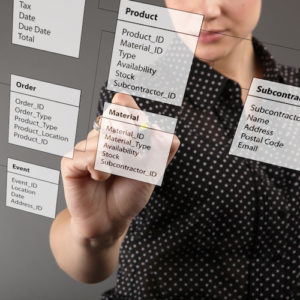 Like all databases, a CRM database has tables. Tables are the most important component of a database. Data are stored in rows within tables.
Like all databases, a CRM database has tables. Tables are the most important component of a database. Data are stored in rows within tables.
In CRM systems, the Account table stores company information. The Contact table stores information about people.
Different CRM vendors have different names for tables. Microsoft calls tables entities. Salesforce.com and GreenRope refer to tables as objects. SugarCRM and Zoho both label tables modules.
All CRM systems come with a standard set of tables. These typically include Accounts, Contacts, Opportunities and Activities. There are usually a variety of other tables that are in place to support the CRM system’s functionality.
Extending a CRM Database
Often, CRM customers have a business need to create tables that do not come standard with a CRM system. Creating custom tables is sometimes referred to as “extending the CRM database.” A CRM customer may want to take data that is currently in spreadsheets or legacy databases and include that data within their CRM database.
Here are just a few simple examples:
A commercial real estate company may want to create a table called Properties to track property addresses and attributes.
A medical device manufacturer might want to create a table called Devices to track which customers have what devices.
A company that provides field service may want to create a table called Service Addresses to track the multiple locations that certain customers have.
Third Party Developers and Custom CRM Database Tables
Third party vendors that offer native functionality within a CRM system rely on the ability to create custom tables.
Some third party applications require many custom database tables in order to deliver a set of add-on functionality. For example, FinancialForce Professional Services Automation adds 38 objects (tables) to a Salesforce org or database.
Can All CRM Databases Be Extended?
Almost all CRM systems allow for adding custom fields to standard tables. However, not all CRM systems allow for adding custom tables to an individual CRM database instance.
A commonly overlooked factor by buyers who are evaluating different CRM offerings is whether custom tables can be added to a given vendor’s CRM database.
Depending on your company’s business needs, the ability to extend a CRM database may be an important consideration when evaluating CRM systems.
Here are some of the vendors that allow for an individual customer to add custom tables to their CRM database instance:
- Microsoft
- Salesforce.com
- SugarCRM
- Zoho
- bpm’online
- Oracle
- GreenRope

